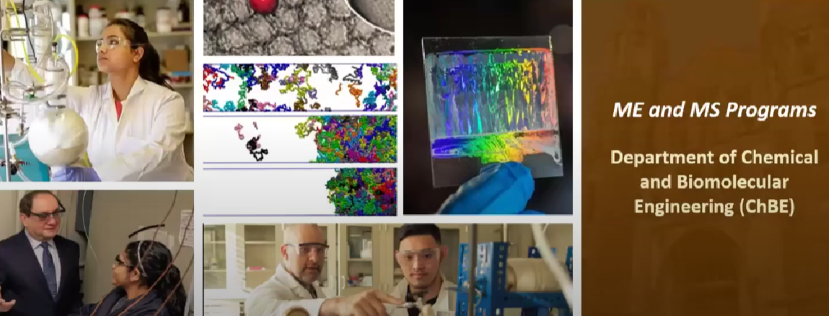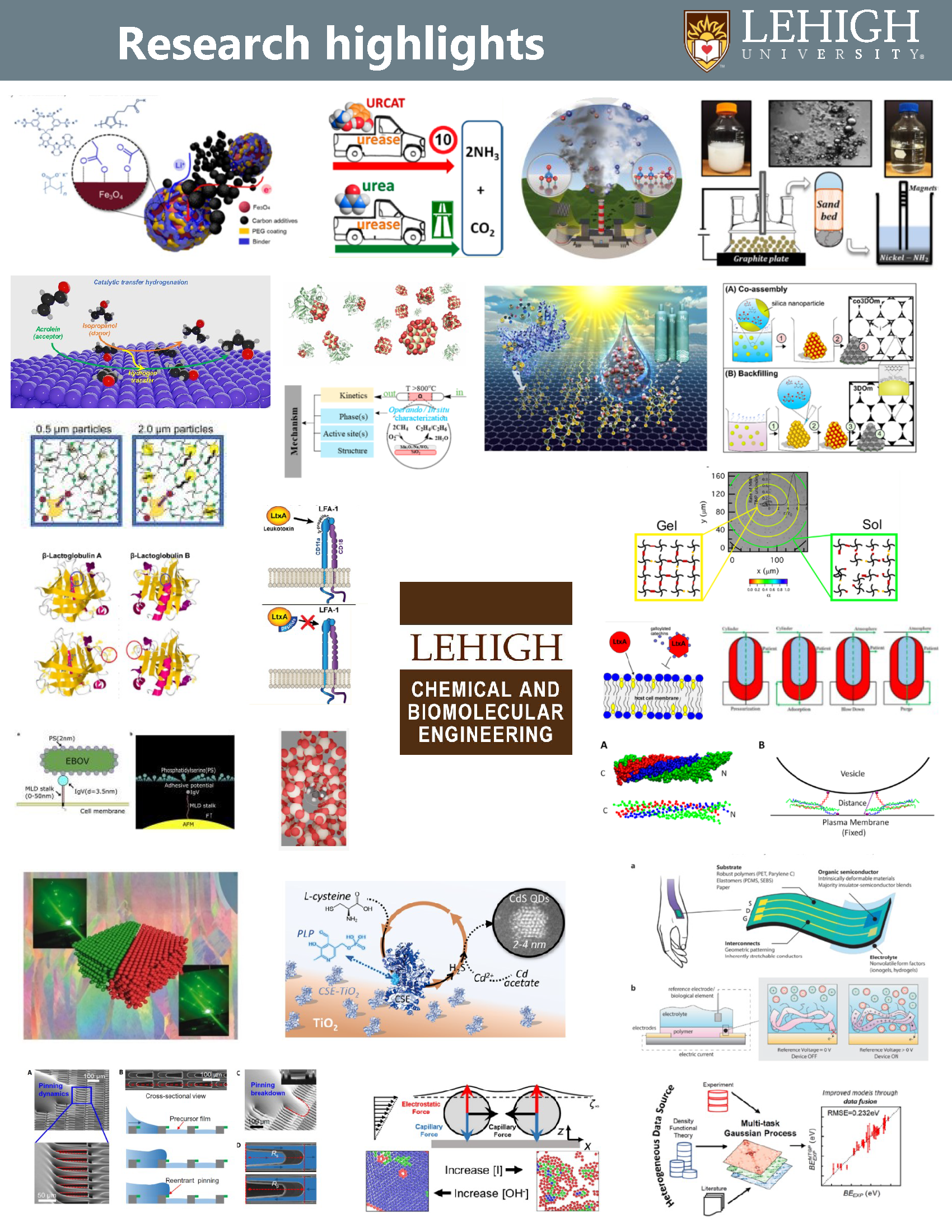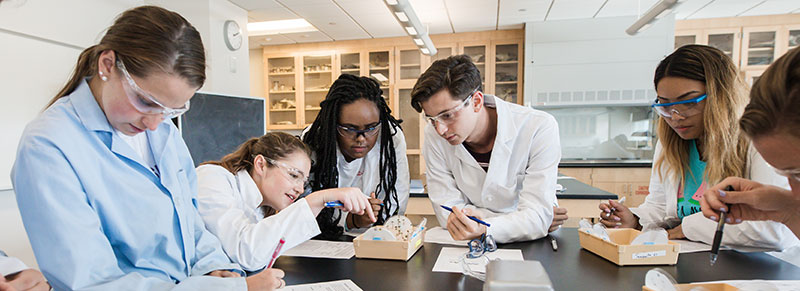Masters in Chemical Engineering (M.S., M.Eng.)
Overview
Our faculty are leading experts in a cross-cutting range of technical areas, and bring state-of-the-art technology, knowledge and teaching methods to the classroom, creating an intellectually stimulating environment for students to engage in advanced learning through our MS/ME degree offerings. Our programs are rigorous, but have a high completion rate within a period of about 12-16 months. In addition to undergraduate majors in chemical engineering, our Master’s program is also suitable for students from related disciplines, including physics, chemistry, and other engineering backgrounds (e.g., Material Science, Mechanical Engineering, Environmental Engineering, etc.)
Lehigh graduates have consistently acknowledged the critical role that their Lehigh Master’s Degree has played in enabling the pursuit and achievement of their goals for career advancement along both technical and management career ladders.
Requirements
The Department of Chemical and Biomolecular Engineering offers two Master degree programs: the Master of Engineering (ME) degree (coursework only, no thesis) and the Master of Science (MS) degree (with research report or thesis). Both programs require 30 credit hours of graduate work.
The Master of Engineering program is comprised of 12 credit hours of the four core chemical engineering courses listed below; 6 credit hours of electives in the chemical engineering field; with the remaining 12 credit hours of electives within or outside of the department.
Requirements for the Master of Science (research report) are: 12 credit hours of four core chemical engineering courses; 6 credit hours of electives in the chemical engineering field; 6 credit hours of research (ChE 480 & 481); and 6 credit hours of electives inside or outside of the department. Requirements for the Master of Science (with thesis) are the same as the research report except the 6 research credits are thesis credit hours (ChE 490). In addition, a department- and college-approved thesis results that is publicly available.
All electives outside of the department can include various specialization courses in areas such as Polymer Science and Material Science. Each program should include the following levels:
- Not less than 30 credit hours of graduate work at 300‐ or 400‐level
- Not less than 18 credit hours of coursework at the 400‐level
- Not less than 18 credit hours in the field of Chemical Engineering
- Not less than 15 credit hours of 400‐level coursework in the Chemical Engineering field
Once accepted, the Master’s degree performance requirements include:
- No course with a grade below a “C‐” may be included in the degree program.
- More than four grades (regardless of number of credits) below “B‐“ terminates the student’s eligibility for continued graduate work at Lehigh.
Admissions
The program is open to applicants with an undergraduate degree in Chemical Engineering from an accredited institution. Applicants with backgrounds in other related science and engineering disciplines (e.g., chemistry, physics, Materials Science and Engineering, Mechanical Engineering, Environmental Engineering, etc.) are also are encouraged to apply.
Curriculum
Core Courses:
- ChE 400: Chemical Engineering Thermodynamics (3 credits)
- ChE 410: Chemical Reaction Engineering (3 credits)
- ChE 415: Transport Processes (3 credits)
- ChE 452: Mathematical Methods in Engineering (3 credits)
Electives: Elective coursework enable students to customize their degree program to meet their career goals. Electives can be chosen from among those offered within and outside chemical and biomolecular engineering.
Common recent Chemical and Biomolecular Engineering electives (CHE-designated) taken by our students include:
- Separation Processes (3 credits)
- Biotechnology I (3 credits)
- Biotechnology II (3 credits)
- Quantitative Biology (3 credits)
- Biochemical Engineering Laboratory (3 credits)
- Numerical Methods for Scientists and Engineers (3 credits)
- Fundamentals of Air Pollution (3 credits)
- Energy: Issues & Technology (3 credits)
- Electrochemical Engineering (3 credits)
- Introduction to Polymer Science (3 credits)
- Physical Polymer Science (3 credits)
- Engineering in Medicine (3 credits)
- Data Driven Modeling for Chemical Sciences and Engineering (3 credits)
- Fundamentals of functional nanoporous materials
- Rheology of Soft Materials (3 credits)
- Heterogeneous Catalysis and Surface Characterization (3 credits)
- Metabolic Engineering (3 credits)
- Molecular Modeling and Simulation (3 credits)
- Soft Materials: Mechanics & Physics (3 credits)
Outside of Chemical and Biomolecular Engineering, our students choose from graduate level electives offered in the fundamental sciences (Chemistry, Physics, Biological Sciences), other engineering disciplines (Materials Science and Engineering, Mechanical Engineering, Bioengineering, Electrical Engineering, Industrial and Systems Engineering), and Lehigh’s Technical Entrepreneurship Program.
Transfer of credits: A maximum of up to nine credits taken at the graduate level elsewhere may be transferred from an accredited graduate college or graduate university to a Lehigh University Engineering Master’s program. All courses must be submitted to the department along with a course description (syllabus), a letter from the university stating that the credits are actual graduate level courses, and not used toward a previous degree, and also an official transcript if not already provided. If transcripts are not provided electronically to the email address below, they can be mailed directly to the Chemical and Biomolecular Engineering Department.
Questions or inquiries?
Please direct all questions or inquiries about this program to inchegs@lehigh.edu.




